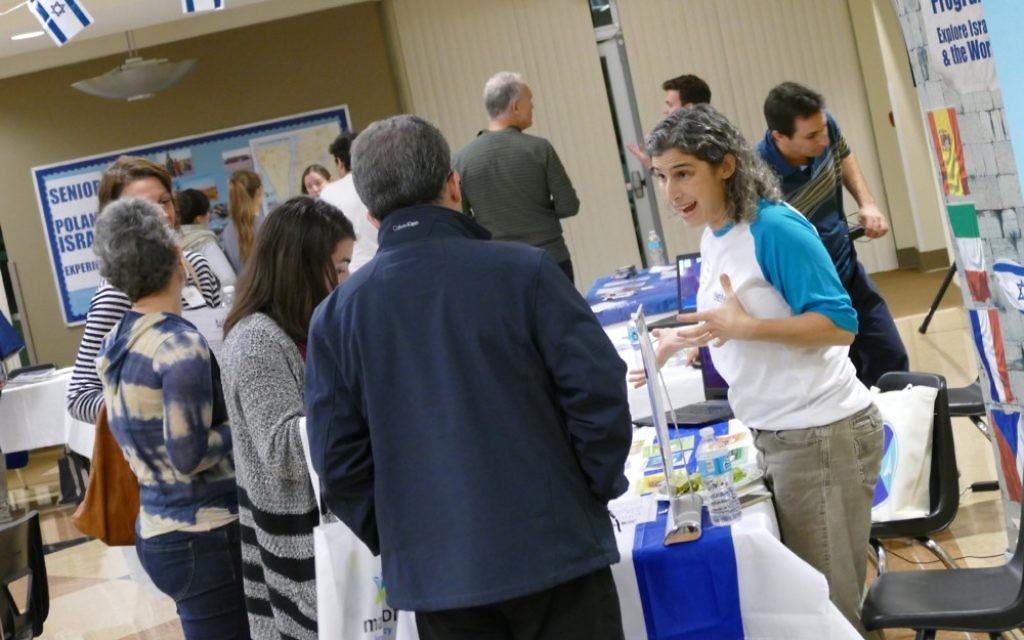12 Options for Israeli Gap Year
Gap years between high school and college aren’t just for the Orthodox.
More than 80 parents and students learned about non-yeshiva Israeli options Wednesday, Nov. 16, during a gap year fair at the Weber School that was co-sponsored by Masa, the umbrella organization for immersive experiences for Jews ages 18 to 30.
The options ranged from academic, university-based programs to service-focused programs, with all kinds of combinations in between. Some require more Hebrew. Most offer the possibility of transferrable college credits and a choice of a semester or a full academic year.
Get The AJT Newsletter by email and never miss our top stories Free Sign Up
While the American Gap Association says there are no solid statistics on how many American students in general take a year for travel, study or other enrichment between high school and college, anecdotal evidence supports the practice as beneficial for the students, who enter college with more maturity and some experience living away from home.
It’s a practice Harvard University, among others, encourages.
“It really does prepare you for your college years,” said Steve Berman, who has sent three daughters on Young Judaea’s gap year program.
He said young adults have plenty of time to get on with college and the rest of their lives, but the gap year provides a chance that doesn’t come again.
“You can all walk into the promised land. You can all see its richness, its goodness, its beauty,” he said. “Grab this moment and make a relationship with your people for the rest of your lives.”
That’s not hyperbole: Berman met his wife, Gita, during their gap year.
“If you’re looking for the love of your life, go on a gap year program,” Gita Berman told fair attendees.
Another parent speaking at the fair, Debbie Rubin, said the Kivunim gap year program in 2011-12 changed her daughter Alex’s life. “She knew that she could do anything.”
Steve Berman said all the programs at the fair are great:
- Aardvark Israel (aardvarkisrael.com), which operates from Jerusalem and Tel Aviv, aims to offer each student an individualized program chosen from a menu of academic, volunteer and internship options, plus add-ons such as cultural exchange in Nepal.
- Bar Ilan University’s Israel Experience (israelxp.com), the most religious of the university-based programs under Masa, combines transferrable academic credits at the Givat Shmuel campus in central Israel with trips around Israel and uplifting Shabbatons to enhance Jewish growth.
- Ben-Gurion University (www.bgustudyabroad.org) provides immersive academics in Be’er Sheva, which is the capital of the Negev and offers more of a college-town feel than universities in Israel’s big cities.
- Bina (www.bina.org.il/gapyear) is a social action program in Tel Aviv that includes academics but focuses on volunteering to create meaningful social change, with the second semester applying full Hebrew immersion.
- Hebrew University (overseas.huji.ac.il/first-year) aims to help gap-year students make the transition from high school with a core course emphasizing preparation and participation, as well as Hebrew ulpan, a variety of academic courses, and options such as community service, art and dance.
- IDC Herzliya (bit.ly/IDCstudyabroad) caters to students from 86 countries and offers three-year degree programs in addition to a year abroad, all taught in English.
- Kivunim (www.kivunim.org), based in Jerusalem, has students study the past so they can make their own history by applying an outward-facing vision of Zionism that takes them on international service trips.
- Nativ (www.nativ.org), the Conservative movement’s gap year program, begins with an academic semester in Jerusalem at Hebrew University, the Conservative yeshiva or ulpan, then moves into a semester of volunteering in a development town or youth village.
- Technion (int.technion.ac.il/gap-year-at-technion), Israel’s Haifa-based version of Georgia Tech, offers academics tailored to students aiming for science or engineering degrees, with volunteer work throughout the 10 months and optional Jewish studies.
- Tel Aviv University (international.tau.ac.il) provides academics taught in English along with slightly older college students taking a year abroad (but with extra staff support) while living in student dorms and taking three group trips to see the whole country.
- Yachad (www.yachadisrael.org), one of Israel’s mechina programs, in which Israelis take a gap year before the military, integrates Americans into a leadership and volunteer program with Israelis the same age for tracks in Hebrew or English, rural or urban, religious or secular.
- Young Judaea (www.youngjudaea.org), the oldest gap year program, involves one semester of academics in Jerusalem, one semester of volunteer work in Bat Yam and a special interest month to end the year, plus specialty add-ons throughout.







comments